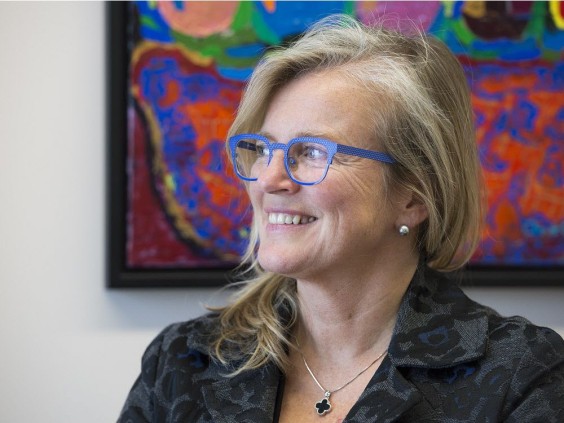
Montreal neurologist says doctors must be better about early detection of ALS
Published in Montreal Gazette June 12, 2018, written by Charlie Fidelman
Dr. Angela Genge, director of the ALS clinic at the Neuro. PHOTO BY GRAHAM HUGHES /Postmedia News files
A top Montreal neurologist says some ALS patients are showing up at her clinic too late to benefit fully from treatment.
A top Montreal neurologist says some ALS patients are showing up at her clinic too late to benefit fully from treatment.
Angela Genge, director of the Montreal Neurological Institute’s ALS Clinical Research Program, says there’s a desperate need to educate medical professionals about recognizing the signs and symptoms of ALS earlier so patients can get the expert care they need fast.
“When I see these patients, I am heartbroken,” Genge said of patients who have lost a year going from doctor to doctor with vague symptoms until the right diagnosis was made, paving the way for a referral to an ALS clinic where they could be eligible for experimental therapies offered in clinical trials.
“What we’re seeing is, the earlier we start the therapy the more the effect and the better the outcome,” Genge said.
Early symptoms vary, but can include clumsiness, tripping and dropping things, slurred speech, tired arms and legs, muscle cramps and twitches. The illness affects an estimated 3,000 Canadians and 200,000 people worldwide.
There is no cure for amyotrophic lateral sclerosis, commonly called Lou Gehrig’s disease, an aggressive neurodegenerative disorder that destroys motor nerve cells in the brain and spinal cord. Most patients succumb to the disease within three to four years; nearly half die within 18 months of diagnosis, and a few will live longer than 10 years.
While it’s hard to predict which patient will survive long-term, doctors should not be telling ALS patients to “go home and get your papers in order,” Genge said. The mortality rate of ALS is similar to pancreatic cancer and brain tumours, and no one tells these patients to go home and prepare to die, she added.
“What some physicians say to ALS patients they’d never say to a cancer patient,” she said.
Looking to raise private funds to establish a Global Centre for Excellence in ALS Research at the Neuro, Genge is hoping to make ALS a treatable, not terminal, disease. The $5-million centre is expected to hire new clinical staff in research and collaborate with researchers around the world as well as partner with industry to implement new techniques to improve early diagnosis, and develop and evaluate drug effectiveness.
The biggest frustration for clinicians with this disease is the slow speed of finding new therapies. ALS was first linked to a genetic mutation in 1993 — the culprit was a SOD1 mutation. Riluzole, the one ALS drug that exists outside of clinical trials in North America, was approved more than two decades ago and extends patients’ lives by a mere few months.
Genge said the first thing patients want to know when they step into her clinic is, “What can you do for me? What will work? What can I do to stop this disease? Well, we have four new trials this year and four next year.”
Patients need to be followed in a multidisciplinary setting where they may have the opportunity to try new therapies being developed, Genge said, and several new drugs are in the pipeline now.
“If you’re sent home and told there’s nothing to be done, well that’s false information,” she said. “Even if there is no cure now, in one or two years, one of these drugs may show a real difference.”
Join our fight to #EndALS!
Sign up as to receive periodic email updates and join our circle of supporters!